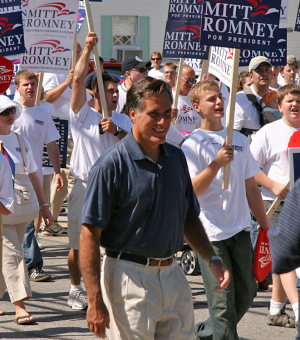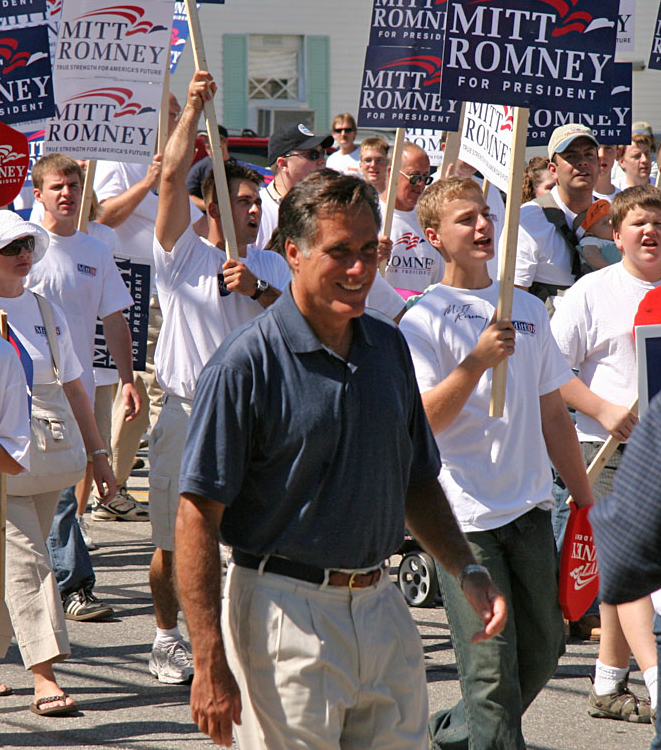It’s no secret that the economy is going to be the dominant theme of the 2012 presidential election. If the Republican presidential candidates agree on one thing, it is that President Obama has mismanaged the economy and that government spending should be reduced. However, there is a good deal of variation among the candidates over how they will approach economic policy–tax cuts, government spending, job creation, and more. Businessman Herman Cain proposed overhauling the tax code through his 9-9-9 plan. Texas Governor Rick Perry suggested gutting three government agencies, the Department of Commerce, the Department of Education, and uh…I’ll have to get back to you on that. Oops.
As the “not-Romney” candidates enjoy their moment in the spotlight before their descent into irrelevancy (it’s Newt Gingrich’s turn this month), the Romney campaign has been quietly putting together a serious and well-organized campaign. I got ahold of some literature from the Romney camp. Believe in America: Mitt Romney’s Plan for Jobs and Economic Growth outlines a number of broad but meaningful proposals on how to revive the economy through a number of key policy areas: taxes, regulations, trade, energy, labor, human capital and fiscal policy.
While at its core Believe in America is standard partisan campaign literature, it does contain a number of serious policy proposals. For example, Romney’s proposals for tax reform deserve a closer look. He proposes tax reform based on the model advocated by the Bowles-Simpson Commission that includes a lower, flatter tax rate on a broader base and through a territorial system. Comprehensive tax reform is something that can benefit the entire country but will need widespread support from Congress, the executive branch, and the public. So while he is not especially specific, it is encouraging to see Romney’s proposals in line with arguments that I’ve seen from members of the two Congressional tax-writing committees, executives in multinational corporations, and economists.

Romney’s trade policies are also worth looking at. He suggests giving the President greater authority to implement free trade agreements, criticizing how long it has taken Congress to pass carefully negotiated agreements. Given how long it took to pass the most recent trade agreements with Panama, Colombia and South Korea, and the fact that Congressional partisanship doesn’t seem to be easing anytime soon, Romney’s call for additional Presidential powers in the trade realm make sense. He also outlines a proposal for an international trade agreement regime open to any member willing to “abide by the rules” (which presumably means the U.S.’s rules). It is a different approach to trade openness than I have seen before, based on the premise that other countries would reap the benefits of this trade agreement, and so the regime will continue to expand as long as member nations agree to the rules. While this is light on details, it would be interesting to see how this proposal shapes up in the general elections should he win the nomination. Unfortunately Romney’s lame attempt to appeal to the Republican base by calling it the “Reagan Economic Zone” makes it hard to take it seriously.
Similarly, what Romney calls “human capital policy” takes a balanced approach, given how far right the talking points seem to be for GOP candidates this election cycle. Part of this is immigration reform which includes raising visa caps for highly skilled foreign workers and granting permanent residency status to immigrants pursuing advanced degrees. As we’ve seen, when economies falter, the tendency is for politicians to give into populist, protectionist sentiments on immigration that do little to improve economic growth. Romney’s approach indicates an understanding that allowing additional high-skilled immigrants in this country will make domestic industries more competitive internationally and that these workers will spend money and generate revenue for the firms that employ them–something which few in his position seem willing to accept.
As expected, some of the plan is utter partisan nonsense. Like House Republicans, Mitt Romney equates deregulatory policy to employment policy, an issue that I addressed in my previous article. Likewise, any time a candidate preaches about how many jobs they created or will create in office, you can just stop paying attention. The chart on page 94 of Romney’s plan that shows how many thousands of jobs in the energy sector President Obama has “destroyed” versus how many jobs Romney’s policy proposals will create is a particurally egregious example of this. Given the vast number of factors that go into businesses’ investment decisions, it is extraordinarily difficult to quantify how a piece of regulation or how a particular tax incentive truly affects employment in the private sector. It is patently unhelpful and misleading when elected officials or campaigners try to do this.
Believe in America is not a step-by-step manual that will bring the American economy to its former level of post-WWII hegemony if followed. But its relative depth and creativity show that Mitt Romney is a serious presidential candidate with serious policy ideas. It’s hard to say the same about the rest of the field.
You can read Believe in America: Mitt Romney’s Plan for Jobs and Economic Growth in full on Mitt Romney’s campaign website.


One Comment on “At Least One GOP Candidate Has an Economic Policy Platform”